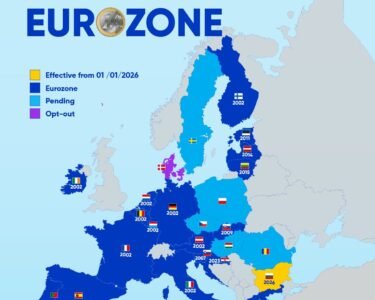As of Jan. 1, 2024, six more countries have joined the drawing room of the Brics: Argentina, Egypt, Ethiopia, Iran, Saudi Arabia, and the United Arab Emirates will join China, India, Russia, Brazil, and South Africa, and together they will account for 36% of the world's GDP but more importantly 47% of the Earth's population. What do these countries have in common? Little or nothing. But they want to create a club of emerging economic powers with the goal of undermining the United States, Europe and Japan from the central role they have played in the world economy especially since World War II.
The differences between these emerging countries and the West they would like to replace are abysmal. What we call the West corresponds to the great economic, political, and military alliance that has united Europe, the United States, and Canada but has also ended up involving to varying degrees a continent as far away as Australia, an Eastern giant like Japan, and highly innovative economies like Taiwan and South Korea.
This Western world is characterized and united by two pillars: pluralistic democracy and the open market economy system.
On these two pillars, with alternating phases, the West has built the richest and least unjust area of the world overall. However deep the distances and social inequalities may be in our neck of the woods they are very little compared to those in all the countries that are part of the Brics.
And what about political regimes? China, Russia, Saudi Arabia, the Emirates, Egypt, all of which are ruled by autocracies, are hardly examples of democracy. Iran is even a theocratic regime. South Africa is formally a democracy but human rights are systematically trampled on there; Ethiopia is a very fragile democracy torn apart by ethnic clashes that periodically erupt into civil wars. Brazil and Argentina freed themselves from violent dictatorships only in the mid-1980s but are ravaged by very strong social conflicts and ravaged by populism and corruption. India is a case in point because a fairly tried-and-true democracy even though, under Modi's presidency, it is degenerating into an intolerant system that creates strong social and religious marginalizations, jeopardizing the very solidity of post-colonial democracy
The living room of the Brics contrasted with that of the West appears very distant in the basic values that ground those countries and ours. Their economies then are hardly comparable to each other. What the political state capitalism of China has in common with the economies of Russia of Arabia and the Emirates is difficult to describe.
Yet despite their differences, these countries dream of being able to put up a united front to take over from the West, based on the demographic factor, in which they have a strong advantage, and on the basis of growth that, after the flashes of past years, is beginning to run out of breath.
The leading country of the Brics is China, or at least that is how Xi Jinping would like it to be. On the strength of his third term in office and aspiring to rule for a long time, Xi plans to make China the leading player on the world stage in the coming decades. But China must reckon with India and the interconnectedness of its economy with the very West whose end he would like to see.
India will never accept being "led" by China with which, by the way, it has strong territorial disputes and rivalries in the South Asian area. And how will Arabia and the Emirates deal with China's borderline genocidal repression of the Turkic-speaking Muslim Uighur minority in Xinjiang?
Moreover, if China decided to steer the Brics on a collision course with the Western world it would end up triggering a gigantic financial economic decoupling from the United States and Europe, which are its main trading partners. It would be a huge mistake that would deprive China of relations with rich and advanced economies of more than 800 million people and replace them with fragile and incomparably more technologically backward economies.
The juxtaposition between capitalism and Soviet communism was based on two irreconcilable worldviews and not just economics. The opposition that China would like to create and lead with respect to the West has no ideological amalgam ,no political and economic model to propose. The very idea of building a common currency appears to be an unrealistic project based only on the large numbers of populations that could adopt it but not on an underlying wealth and stability, which are essential so that the currency is not just waste paper or a manifesto token.
Despite all this, the West must not underestimate the challenge and must respond without making the mistakes of the past, remote and recent. Four are the strategic lines it should follow and to which we will return with more insights in the upcoming geopolitics specials of The Discussion:
1)enhancing and strengthening democracy;
2)give its economy a strong boost of innovation, based on research, development and new technologies
3)attracting other promising countries such as Indonesia, Singapore, Viet Nam, the Philippines, and New Zealand into its orbit;
4)aim for development that is not colonial but respectful of the sovereignty of the countries of Africa that have been neglected for too long.
This is a huge job that must be done together without any desire to dominate the Brics but with the understanding that threats should never be underestimated.
*Published on The Discussion





